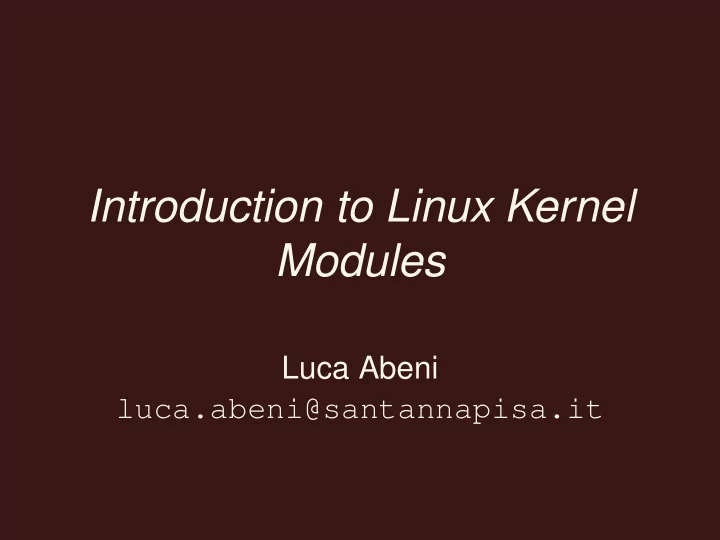

Introduction to Linux Kernel Modules Luca Abeni luca.abeni@santannapisa.it
Linux Kernel Modules Kernel module: code that can be dynamically • loaded/unloaded into the kernel at runtime Change the kernel code without needing to reboot • the system More technically: the modules’ object code is • dynamically linked to the running kernel code Form of dynamic linking! • This mechanism can be used for some simple • experiments on Linux kernel programming! Kernel Programming Introduction to Linux Kernel Modules
Using Kernel Modules Kernel Module: kernel object → .ko file • Inserted with modprobe <module name> • Can be removed with rmmod <module name> • When inserted, a kernel module can: • Register some services • Start some tasks (kernel threads) • A kernel module can use some exported kernel • functions Kernel Programming Introduction to Linux Kernel Modules
Kernel Programming - 1 No single entry point (no “ main() function) • No memory protection • Kernel Memory Address Space: all the memory • can be accessed Kernel-space tasks can easily corrupt important • data structures! Not linked to standard libraries • Cannot include <stdio.h> and friends... • No standard C library! • Kernel Programming Introduction to Linux Kernel Modules
Kernel Programming - 2 The kernel (or nanokernel, or ...) provides some • functions we can use Example, no printf() , but printk() ... • Errors do not result in segmentation faults... • ...But can cause system crashes! • Other weird details • No floating point (do not use float or double ) • Small stack ( 4 KB or 8 KB ) • Atomic contexts, ... • Kernel Programming Introduction to Linux Kernel Modules
Kernel Programming Language OS kernels are generally coded in C or C++ • The Linux kernel uses C • Subset of C99 + some extensions ( likely() / • unlikely() annotations, etc...) As said, no access to standard libraries • Different set of header files and utility functions • Some Assembly is used (for entry points, etc...) • Example: Linked Lists ( include/linux/list.h ) • Kernel Programming Introduction to Linux Kernel Modules
Writing Linux Kernel Modules Written in C99 + extensions (see previous slide) • Must include some headers: • #include <linux/module.h> #include <linux/kernel.h> #include <linux/init.h> Must define two entry points: init and cleanup • Init entry point: called when the module is • inserted Cleanup entry point: called when the module is • removed Kernel Programming Introduction to Linux Kernel Modules
The Init Entry Point static int __init my_init( void ) { ... return 0; } module_init(my_init); static : not used outside this compilation unit • init : annotation for the kernel (not used after • insmod ) return 0; : module initialised without errors • module init(my init); : mark my init as the • init entry point Kernel Programming Introduction to Linux Kernel Modules
The Exit Entry Point static void __exit my_cleanup( void ) { ... } module_exit(my_cleanup); exit : annotation for the kernel (used only in • rmmod ) module exit(my cleanup); : mark my cleanup • as the cleanup entry point Responsible for undoing things done by init • If not defined, the module cannot be unloaded • Kernel Programming Introduction to Linux Kernel Modules
Compiling Linux Kernel Modules Compiling user-space code is simple • gcc without additional parameters works • Makefiles and similar for more complex programs • But compiling kernel code is more difficult! • “Freestanding” programming environment → • special compiler options are needed The compiler defaults might change from version • to version ... • Fortunately, Linux developers already did the dirty • work for us! KBuild system • Kernel Programming Introduction to Linux Kernel Modules
KBuild Set of Makefiles, programs and scripts used to build • the Linux kernel Already knows which compiler options to use • Simpler to use than “regular” Makefiles • We just need to tell kbuild the name of the • module we want to build Supports the compilation of kernel modules • Even external (out-of-tree) modules! • Kernel Programming Introduction to Linux Kernel Modules
Using KBuild Based on Makefiles • Important line: “ obj-m = modulename.o ” • This assumes modules composed by one single • compilation unit ( .c file) In case of multiple compilation units, use • “ modulename-objs = ... ” (list of .o files) To use it, we must tell make where KBuild is • make -C PathToLinuxSources M=$(pwd) • Where “ PathToLinuxSources ” is the • pathname of a compiled Linux kernel The “ -C ... ” complication can be embedded in a • Makefile rule (see example) Kernel Programming Introduction to Linux Kernel Modules
Applications as Kernel Modules The init entry point must return quickly • modprobe does not terminate until init returns • It can create some threads, or register some device, • and return After loading the module, the application is • started! The cleanup entry point stops the threads / • unregister the device See example • Kernel Programming Introduction to Linux Kernel Modules
Recommend
More recommend